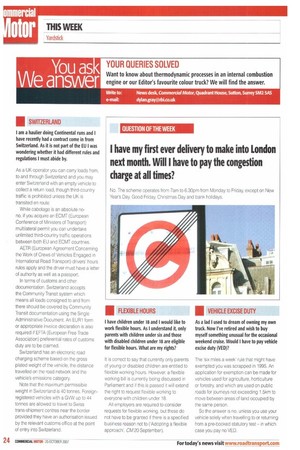YOUR QUERIES SOLVED
Page 24

If you've noticed an error in this article please click here to report it so we can fix it.
Want to know about thermodynamic processes in an internal combustion engine or our Editor's favourite colour truck? We will find the answer.
Write to: News desk. Commend& Motor, Quadrant House, Sutton, Surrey SM2 SAS e-mail: dylan.gravOrbi.co.uk
• SWITZERLAND
I am a haulier doing Continental runs and I have recently had a contract come in from Switzerland. As it is not part of the EU I was wondering whether it had different rules and regulations I must abide by.
As a UK operator you can carry loads from, to and through Switzerland and you may enter Switzerland with an empty vehicle to collect a return load, though third-country traffic is prohibited unless the UK is transited en route.
While cabotage is an absolute nono, if you acquire an ECMT (European Conference of Ministers of Transport) multilateral permit you can undertake unlimited third-country traffic operations between both EU and ECMT countries.
AETR (European Agreement Concerning the Work of Crews of Vehicles Engaged in International Road Transport) drivers hours rules apply and the driver must have a letter of authority as well as a passport.
In terms of customs and other documentation, Switzerland accepts the Community Transit system which means all loads consigned to and from there should be covered by Community Transit documentation using the Single Administrative Document. An EUR1 form or appropriate invoice declaration is also required if EFTA (European Free Trade Association) preferential rates of customs duty are to be claimed.
Switzerland has an electronic road charging scheme based on the gross plated weight of the vehicle, the distance travelled on the road network and the vehicle's emissions category.
Note that the maximum permissible weight in Switzerland is 40 tonnes. Foreignregistered vehicles with a GVW up to 44 tonnes are allowed to travel to Swiss trans-shipment centres near the border provided they have an authorisation issued by the relevant customs office at the point of entry into Switzerland.
• FLEXIBLE HOURS
I have children under 18 and I would like to work flexible hours. As I understand it, only parents with children under six and those with disabled children under 18 are eligible for flexible hours. What are my rights?
It is correct to say that currently only parents of young or disabled children are entitled to flexible working hours. However, a flexible working bill is currently being discussed in Parliament and if this is passed it will extend the right to request flexible working to everyone with children under 18.
All employers are required to consider requests for flexible working, but these do not have to be granted if there is a specified business reason not to (Adopting a flexible approach'. CM 20 September).
• VEHICLE EXCISE DUTY
As a lad I used to dream of owning my own truck. Now I've retired and wish to buy myself something unusual for the occasional weekend cruise. Would I have to pay vehicle excise duty (VED)?
The 'six miles a week' rule that might have exempted you was scrapped in 1995. An application for exemption can be made for vehicles used for agriculture, horticulture or forestry, and which are used on public roads for journeys not exceeding 1.5km to move between areas of land occupied by the same person.
So the answer is no, unless you use your vehicle solely when travelling to or returning from a pre-booked statutory test in which case you pay no VED.


























































































































































































